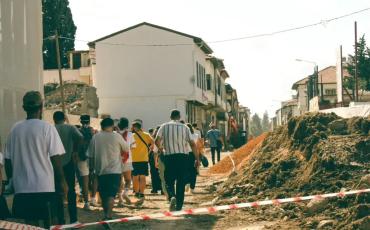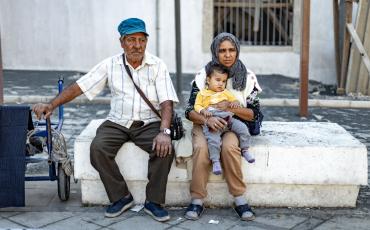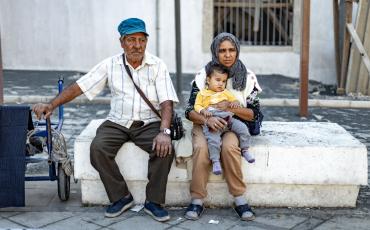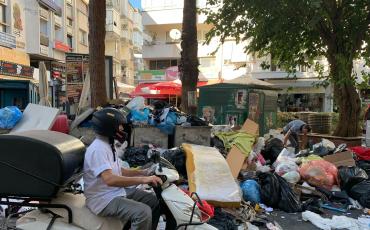Resumed political violence in Turkey reveals deep-rooted tensions. As attacks hit the provinces of Şanlıurfa, Hakkari and Iğdır, together with the recent bombings in Ankara, the ruling AKP seeks to profit from the ensuing chaos. With the upcoming parliamentary elections on November 1, what does this mean for the prospects of Turkish democracy? By Timur Akhmetov
It all started on July 20 when the “Islamic State” (IS) barbarically attacked Kurdish youth in the border city of Suruç. The nation was shocked not only by the scale of destruction, but also by how confused the local authorities were. The attack took 32 lives, mostly young men heading to reconstruction works in the dominantly Kurdish city of Kobani. A symbol for the struggle of the Kurds against the rule of IS, Kobani was “liberated” only several months ago by the Kurdish armed forces. As the Turkish government refrained from intervention, Kurdish activists from the Workers’ Party of Kurdistan (PKK) blamed the recent tragedy on the passivity of the authorities.
The retaliatory attacks carried out against Turkish police officers quickly opened the gates of hell. The Turkish government mobilized vast resources to fight the PKK, classified by Ankara as a terrorist organization, even though the Suruç bombing was originally carried out by the IS. In effect, many PKK members were arrested, which led to an open conflict between the main forces of the PKK and the Turkish army. On September 6, PKK-fighters attacked a remote army base near Dağlıca, killing more than 16 Turkish soldiers. Then, two days later, 14 policemen were killed in a road attack in the eastern province of Iğdır. The rapid escalation of violence in the long-simmering conflict created an atmosphere similar to the 1990s, when the nation stood on the brink of civil war.
But harsh security measures do not help to provide for safety. The horrific double bombings on October 10 in Ankara that resulted in 107 deaths testify to that. Instead, major political parties, above all the Justice and Development Party (known by its Turkish acronym AKP) and the People’s Democracy Party (HDP) rushed to accuse each other of instigating violence. This only further contributes to the polarization among the populace.
Divide, provoke, and rule
Meanwhile, the ruling AKP finds itself discombobulated. In June, it lost its long held majority in the parliament elections, while the pro-Kurdish HDP gained an unprecedented 13 percent of the vote. This meant that the HDP could secure its position in parliament for the first time as a political party, not merely as a group of independent candidates. Election gurus concluded that the HDP succeeded because it attracted thousands of people that were discontented with the social division the AKP has created throughout the country.
The election's result also effectively confounded the political coalitions. For its part, pro-AKP media accused the HDP and its co-chairman and ambitious politician Selahattin Demirtaş of the support for separatism and terrorism. Demonization of the HDP, as calculated by the AKP, should diminish the chance of further success. Other political parties, such as the social-democratic CHP and the far-right nationalist MHP, were successfully instrumentalized by the AKP during the coalition talks. But an actual government, however, could not be formed, which is why a new round of parliamentary elections is now scheduled for November 1.
Erdoğan is eager to regain the majority with all means possible. Arguably, this exceeds the limits of the democratic process. As such, the AKP is mobilizing its cadres within the state machinery and powerful network of activists to pressure and attack critical media outlets. The political opposition also is subjected to attacks. Finally, a regime of special rule is being implemented in the eastern provinces so as to delimit electoral campaigning, making it impossible for the HDP to campaign in its stronghold.
Amidst the spiraling chaos, Recep Tayyip Erdoğan, the venerable leader of the conservatives in the AKP, wants to avoid losing his grip within the parliament. The stakes are high. As many predict, Erdoğan would reach a peak in his political career if he managed to follow through with his proposal to re-write the secular constitution, imposed by the military regime in 1982 and a long-standing fiend to many Turks. Since he would need enough parliamentary seats after the November elections, Erdoğan currently presents the nation two alternatives: either continuing bloodshed or stability and 400 seats for the AKP. This is a well too known tactic among authoritarian regimes in the Middle East and beyond, where once elected rulers craving for more power present themselves as the only solution in times of (instigated) instability and violence.
Yet, it would be overly naïve to consider the current problems of Turkey a direct result of one man’s ambitions. Rather, the political evolution of the conservative forces united around the AKP; the party’s ideological positioning as well as the interparty relations make clear that the AKP stands before a watershed. This could impact not just the future of the political conservatives but more importantly the very consolidation of democracy in Turkey – or its disarray.
The historic background
Historically, governmental changes in Turkey comprised both democratic ruptures, more or less successful, as well as military overthrows. The nation experienced highly explosive political conflicts together with the ensuing meddling by the military at least four times for the last 55 years. This started as early as 1960, when the Turkish experiment with a multiparty system ended with a coup d’état and the execution of leaders of the then deposed Democratic Party (DP).
The DP became the springboard for religious conservatives who started organizing themselves in political forces. They did so by utilizing available democratic means within the radical secular regime of the Turkish republic that Ataturk had created. From the DP, the political evolution of the mainstream conservatives then went through the National Order Party (1970-1971), National Salvation Party (1972-1981) and Welfare Party (1983-1998). These parties contributed considerably to the debate over and criticism of the secular character of the Turkish regime. Thus, it is no wonder that the army, who has been positing itself since the 1960s as a guardian of Ataturk’s principles, didn’t shun from closing them. In fact, most religious conservatives governments had been replaced by military intervention, not by democratic means. Such intransigence however deprived the political parties together with Turkish democracy in general of important experience.
This began to change only with the rise of the AKP, founded in 2001 by young reformist politicians of the formerly banned Welfare Party. The party emphasized human rights, primarily in the sensible issue of religious freedoms. It promised to limit the influence of the army in politics. It proposed neoliberal views on the economy. And it promoted progressive views of the EU, foreign policy, and the secular character of the state. All this contributed to its tremendous electoral victories in 2002, 2007 and 2011. The AKP was praised internationally as a party that sensed the current zeitgeist and managed to satisfy the needs, hopes, and demands of people for a change.
Democracy at the crossroads
Yet, the fascinating success of the AKP, alas and alack, quickly turned into a story of the rise of a power hungry leviathan. Due to ideological regress and the volatile international and regional environment since 2011, the AKP-leadership started taking unpopular steps to curb opposing voices in the country. Most prominently, the Gezi protests revealed not only the tendency of the AKP to ignore the discontented, but also showed the widening gap between the European democratic standards and Turkish realities. Moreover, the foreign policy of the Turkish government failed to respond to the Arab uprisings and the ensuing regional turmoil, which contributed to the prolonged quagmire in the neighboring countries of Syria and Iraq. Thus, the current political stalemate in Turkey is a combination of lack of experience in dealing with criticism, unpreparedness of the Turkish foreign policy decision-makers and ideological inertness of the Turkish leadership.
While at the pinnacle of its success, the AKP was seen as the most potent force to end the prolonged armed struggle with the PKK. And indeed, after having successfully limited the army’s influence in the decision making in the 2000s, the AKP got the much needed free hand in dealing with the Kurdish issue. Positive changes were made regarding the use of the Kurdish language, and a state TV channel in Kurdish began broadcasting in 2009. By no means complete, such steps towards reconciliation nevertheless brought support for the party among conservative Kurds, hence contributing to further electoral victories of the AKP. Then, in 2013, unprecedented negotiations with the PKK over a possible cease-fire agreement and subsequent talks over a final solution to the conflict nourished hopes inside and outside Turkey.
Two years after however, such hopes have vanished. Instead, the government is trying to rekindle the conflict while seeking political benefits from the chaos and uncertainty prior to the upcoming elections.
But in light of the many challenges it faces, the AKP is also hard-pressed to cooperate and make painful compromises. If the present picture of the electoral outcome is any indication, the party will be forced to join a coalition government, which means a lot given the recent history of one-party-rule. Yet, before they even want to build a coalition together with the AKP, major opposition parties demand investigation of the corruption cases within the AKP government. If this should happen, the AKP would have to initiate legal actions against high rank members, which would further aggravate the ongoing crisis within the party itself.
Moreover, even though Erdoğan has effectively eclipsed other founding fathers of the AKP like former Turkish president Abdullah Gül, personalization of the party leadership leads to overall stagnation. The tendency to the one-man rule hinders creativity and the emergence of new ideas that could potentially bring support for the party among the voters. As such, the concentration of the power in one man’s hands contributes to further fragmentation and division, a peculiarity of the Turkish party system.
Prospects of democratization
Samuel Huntington, in one of his seminal works, “The Third Way: Democratization in the Late Twentieth Century”, pointed towards a crucial prerequisite for successful democratization: the “turnover test”. He noted, that a ruling political force must be willing to give up power as a result of free and fair elections. Even though it is highly unlikely that the AKP will actually be replaced in the upcoming elections in November, simply compromising over the government might tell us a lot about the state of the Turkish democracy today. Unless there is some consensus over the rules of the game, the democratic system will be abused for individual political ambitions. Thus, all political parties, key among them the AKP, must therefore work to nourish it.
Against this backdrop, the Director of the Center of Turkish Politics and History at Bilkent University, Metin Heper, evaluates the prospects for such democratic consolidation. In his book “Political Parties in Turkey”, Heper writes: “The first prerequisite for the consolidation of democracy is a consensus among the members of the political class on the rules of democracy – freedom of expression, absence of restrictions on political participation, free and fair elections, and the like. Second, there must be national unity; political actors must act in unison when democracy faces a critical threat. For them to act in such a manner, trust and harmony among political actors is needed. Finally, for the consolidation of democracy in Turkey, political actors must act in a responsible and responsive manner. This means paying attention to the long-term interests of the country”.
Yet, in the aftermath of the national elections in June, when the recent clashes broke out, the ruling party has implemented a strategy to curb political freedoms and resort to authoritarian methods. This demonstrates that the AKP is not ready so far to compromise and share power, thus undermining the prospects for the consolidation of democracy in Turkey. Given such authoritarian inclinations inside the party, the fate of the Turkish democracy lies in the hands of the AKP.






















